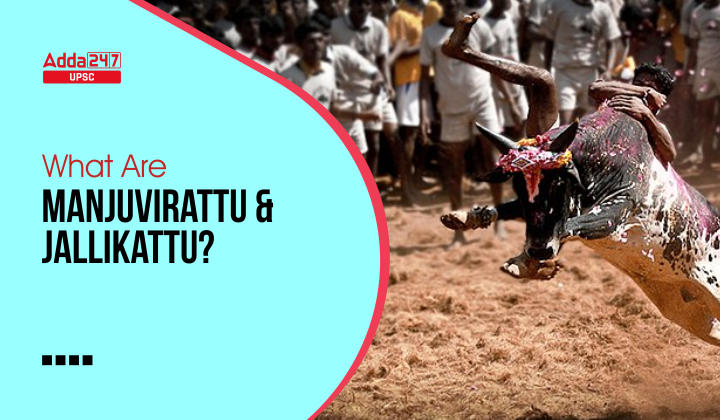Table of Contents
What Are Manjuvirattu And Jallikattu? : Both Jallikattu and Manjuvirattu are bull gaming sport played in Tamil Nadu during Mattu Pongal, a day after January 14.
Our Topic ”Manjuvirattu” And ”Jallikattu” Covers UPSC Prelims: History, Art And Culture And UPSC Mains: GS Paper 1 – Indian History- The salient aspects of Art Forms, Literature and Architecture from ancient to modern times.
Jallikattu- T.N. govt. allows Jallikattu
Context
These days Jallikattu and manjuvirattu are being held after Maatu Pongal across Tamil Nadu.
What is Jallikattu?
- The term ‘jallikattu’ is derived from the tamil words ‘jalli’ and ‘kattu’. Jalli refers to gold or silver coins. Kattu means ‘tied’.
- Therefore, combined together it refers to coins being tied to the bulls’ horns, which is considered the prize for whoever tames the bull.
- The bull that wins is used to service numerous cows preserving the native breed. It is renowned as an ancient ‘sport’, believed to have been practised some 2500 years ago.
- In This traditional sport contestants try to tame a bull for a prize; if they fail, the bull owner wins the prize.
Importance Of Jallikattu In Tamil culture
-
- In Tamil Nadu, jallikattu is both a religious and cultural event celebrated by the people of the State and its influence extends beyond the confines of caste and creed.
- Jallikattu is also a tool for conserving this precious indigenous breed of livestock
- Kangayam, Pulikulam, Umbalachery, Barugur and Malai Maadu are among the popular native cattle breeds used for Jallikattu.
What Is The Difference Between Jallikattu And Kambala?
Jallikattu
- Jallikattu is a bull gaming sport played in Tamil Nadu during Mattu Pongal, a day after January 14.
- Interestingly, the word ‘Jallikattu’ is derived from a coinage in Tamil which means the silver and gold coins that are tied to the horns of the buffaloes.
- In Jallikattu, the effort is to hold onto the bulls for a specific distance and a stipulated amount of Time. The animals are let out in an open ground or on the roads and people attempt to control it.
- Jallikattu is known to be a sport that is nearly 2000 years old where men used to play it to showcase their strength to find a wife.
Kambala
- Kambala, on the other hand, is a buffalo race held during November to March which is largely seen around the area of Dakshin Kannada and surrounding at as called Tulunadu. In Kambala, initially, coconuts used to be the prize. But for the last few decades, gold coins and trophies have become replaced coconuts.
- In Kambala, a pair of bullocks are tied to a plough and along with their jockey, they race through muddy waters along a track. The bullocks are usually times by their speed and distance covered in seconds. The tracks are usually 120 to 140 metres and the best bullocks cover the distance in less than 13 seconds.
- Kambala is a practice that is nearly 800 years old where the farming community as well as the landlords of Tulunadu believed that it would appease the gods and give them a good harvest. The festival is said to have stared at the famous Kadri temple dedicated to Lord Manjunatha.
What Is Manju Virattu?
- Manju virattu literally means ‘bull chasing’.
- Manju Virattu is a type of Jallikattu practiced in the districts of Madurai, Pudukkottai, Theni, Thanjavur, and Salem.
- It involves an array of bulls being released one after another from an enclosure with an opening.
- As the bull comes out of the enclosure, one person clings to the hump of the bull. In its attempt to break free, the bull shakes the person off will bolts while some try to hook the player with their horns.
- To win the prize, the participant is expected to hold the running bull for a predetermined time and distance to win the prize. At a time, one person is allowed to attempt hugging the bull.
- This rule is being strictly followed by the village committee, who takes charge of the event.
How Manjuvirattu Is Different From Vaadi Jallikattu?
Manjuvirattu is slightly different from the common vaadi jallikattu.
Vaadi Jallikattu
- In Vaadi Jallikattu the bull will be released from a closed space (vadi vasal) and the tamers attempt to wrap their arms or hands around the hump of the bull and hold on to it to win the award.
- Only one person is allowed to attempt at a time.
Manjuvirattu
- While in Manjuvirattu, the bull will be tied to a small post or to a hook or to a big stone. There are no other physical restrictions for the bull and hence it can move freely anywhere.
- The maximum time period given is 30 minutes. A team of seven to nine members can attempt to untie the gift token that is tied on the bull’s horn.
Recent Art & Culture Articles:



 TSPSC Group 1 Question Paper 2024, Downl...
TSPSC Group 1 Question Paper 2024, Downl...
 TSPSC Group 1 Answer key 2024 Out, Downl...
TSPSC Group 1 Answer key 2024 Out, Downl...
 UPSC Prelims 2024 Question Paper, Downlo...
UPSC Prelims 2024 Question Paper, Downlo...




